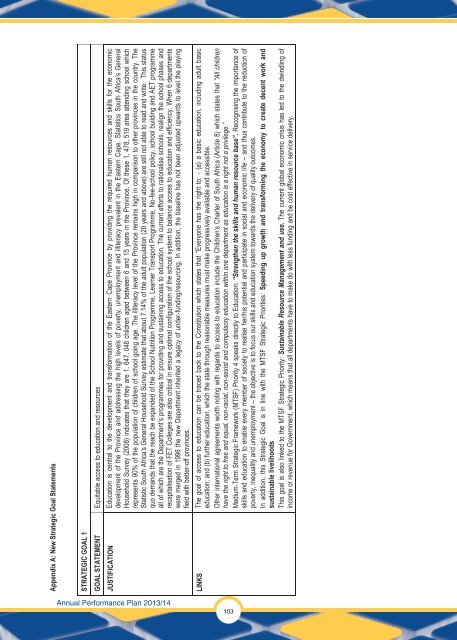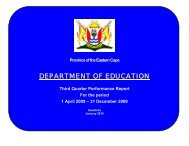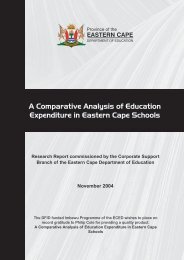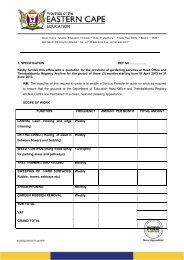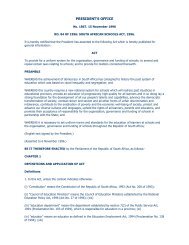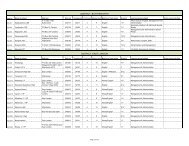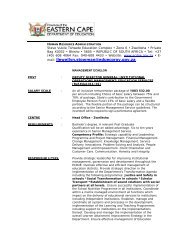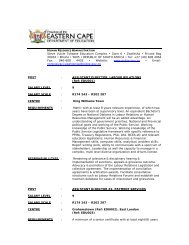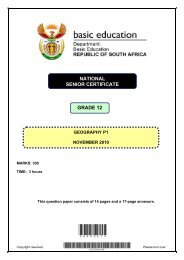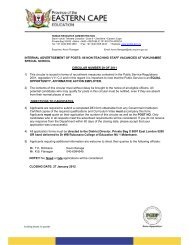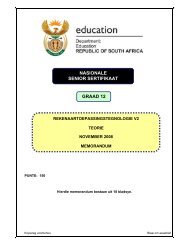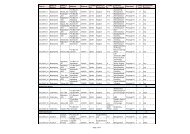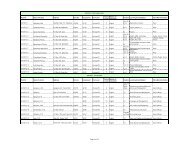Annual Performance Plan 2013/14 - Department of Education
Annual Performance Plan 2013/14 - Department of Education
Annual Performance Plan 2013/14 - Department of Education
Create successful ePaper yourself
Turn your PDF publications into a flip-book with our unique Google optimized e-Paper software.
<strong>Annual</strong> <strong>Performance</strong> <strong>Plan</strong> <strong>2013</strong>/<strong>14</strong><br />
103<br />
Appendix A: New Strategic Goal Statements<br />
STRATEGIC GOAL 1<br />
GOAL STATEMENT Equitable access to education and resources<br />
JUSTIFICATION <strong>Education</strong> is central to the development and transformation <strong>of</strong> the Eastern Cape Province by providing the required human resources and skills for the economic<br />
development <strong>of</strong> the Province and addressing the high levels <strong>of</strong> poverty, unemployment and illiteracy prevalent in the Eastern Cape. Statistics South Africa’s General<br />
Household Survey (2008) indicates that they are 1, 647, 048 children aged between 6 and 15 years in the Province. Of these 1, 478, 519 area attending school which<br />
represents 90% <strong>of</strong> the population <strong>of</strong> children <strong>of</strong> school going age. The illiteracy level <strong>of</strong> the Province remains high in comparison to other provinces in the country. The<br />
Statistic South Africa’s General Household Survey estimate that about 7.<strong>14</strong>% <strong>of</strong> the adult population (20 years and above) are still not able to read and write. This status<br />
quo demands that the reach be expanded <strong>of</strong> the School Nutrition Programme, Learner Transport Programme, No-fee-school policy, school building and AET programme<br />
all <strong>of</strong> which are the <strong>Department</strong>’s programmes for providing and sustaining access to education. The current efforts to rationalise schools, realign the school phases and<br />
recapitalisation <strong>of</strong> FET Colleges are also critical in ensure optimal configuration <strong>of</strong> the school system to balance access to education and efficiency. When 6 departments<br />
were merged in 1996 the new <strong>Department</strong> inherited a legacy <strong>of</strong> under-funding/resourcing. In addition, the baseline has not been adjusted upwards to level the playing<br />
field with better-<strong>of</strong>f provinces.<br />
LINKS The goal <strong>of</strong> access to education can be traced back to the Constitution which states that “Everyone has the right to: - (a) a basic education, including adult basic<br />
education; and (b) further education, which the state through reasonable measures must make progressively available and accessible.<br />
Other international agreements worth noting with regards to access to education include the Children’s Charter <strong>of</strong> South Africa (Article 8) which states that “All children<br />
have the right to free and equal, non-racial, non-sexist and compulsory education within one department as education is a right not a privilege.”<br />
Medium-Term Strategic Framework (MTSF) Priority 4 speaks directly to <strong>Education</strong>: “Strengthen the skills and human resource base”. Recognising the importance <strong>of</strong><br />
skills and education to enable every member <strong>of</strong> society to realise her/his potential and participate in social and economic life – and thus contribute to the reduction <strong>of</strong><br />
poverty, inequality and unemployment – the objective is to focus our skills and education system towards the delivery <strong>of</strong> quality outcomes.<br />
In addition, this Strategic Goal is in line with the MTSF Strategic Priorities: Speeding up growth and transforming the economy to create decent work and<br />
sustainable livelihoods<br />
This goal is also linked to the MTSF Strategic Priority: Sustainable Resource Management and use. The current global economic crisis has led to the dwindling <strong>of</strong><br />
income or revenue for Government, which means that all departments have to make do with less funding and be cost effective in service delivery.


